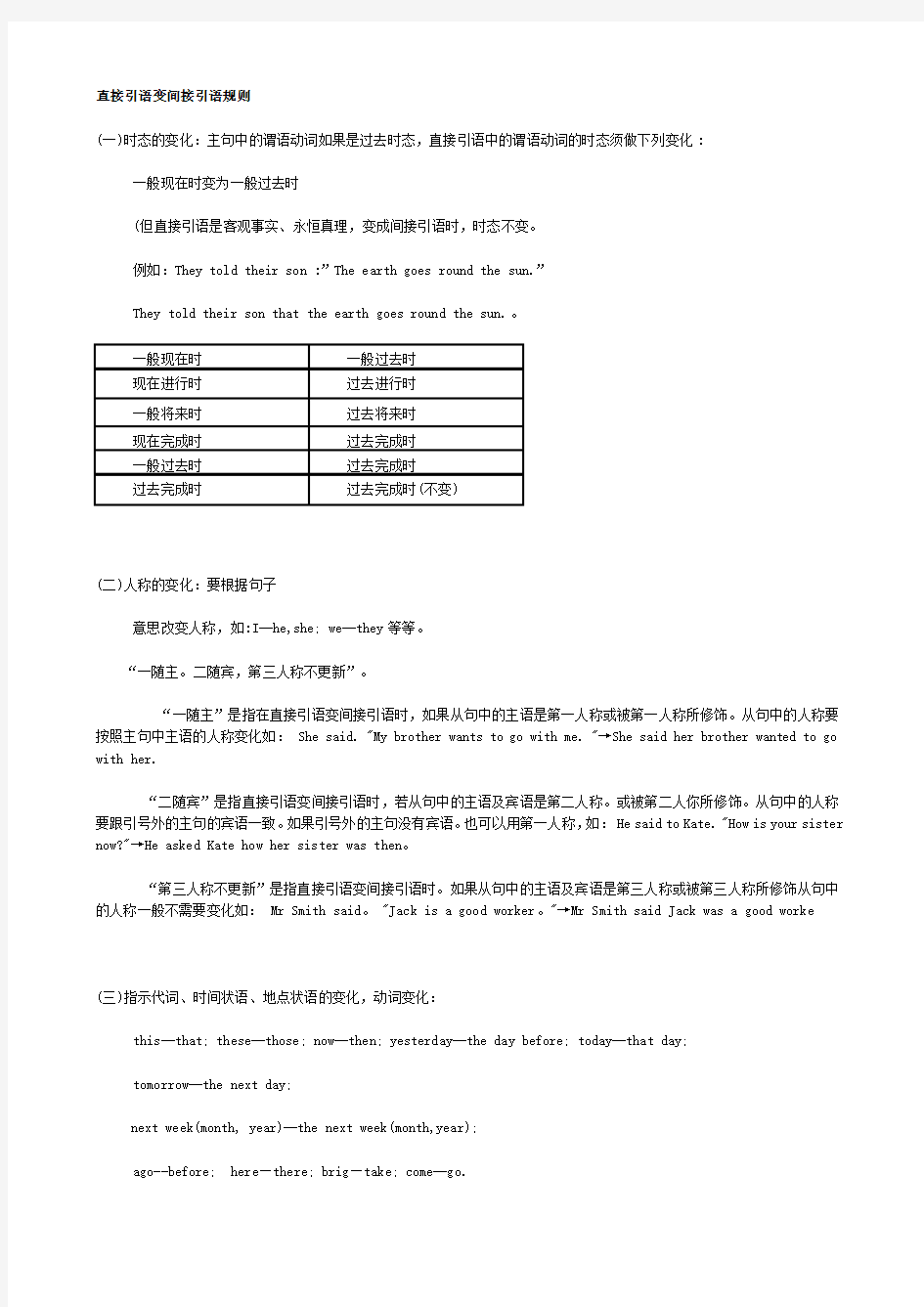直接引语变间接引语规则


直接引语变间接引语规则
(一)时态的变化:主句中的谓语动词如果是过去时态,直接引语中的谓语动词的时态须做下列变化:
一般现在时变为一般过去时
(但直接引语是客观事实、永恒真理,变成间接引语时,时态不变。
例如:They told their son :”The earth goes round the sun.”
They told their son that the earth goes round the sun.。
(二)人称的变化:要根据句子
意思改变人称,如:I--he,she; we--they等等。
“一随主。二随宾,第三人称不更新”。
“一随主”是指在直接引语变间接引语时,如果从句中的主语是第一人称或被第一人称所修饰。从句中的人称要按照主句中主语的人称变化如:She said. "My brother wants to go with me. "→She said her brother wanted to go with her.
“二随宾”是指直接引语变间接引语时,若从句中的主语及宾语是第二人称。或被第二人你所修饰。从句中的人称要跟引号外的主句的宾语一致。如果引号外的主句没有宾语。也可以用第一人称,如: He said to Kate. "How is your sister now?"→He asked Kate how her sister was then。
“第三人称不更新”是指直接引语变间接引语时。如果从句中的主语及宾语是第三人称或被第三人称所修饰从句中的人称一般不需要变化如: Mr Smith said。 "Jack is a good worker。"→Mr Smith said Jack was a good worke
(三)指示代词、时间状语、地点状语的变化,动词变化:
this--that; these--those; now--then; yesterday--the day before; today--that day;
tomorrow--the next day;
next week(month, year)--the next week(month,year);
ago--before; here—there; brig—take; come--go.
直接引语中有具体的过去某年、某月、某日作状语,变为间接引语时,时态不变。
如: Xiao Wang said. "I was born on April 2l, 1980。"
Xiao Wang said he was born on April 20, 1980。
(四) 直接引语转间接引语结构
1、直接引语是陈述句,变成间接引语,由连词that 引导。句式…said/told that…
例如:She said: “ I am very happy to help you.”
She said that she was very happy to help you.
2、直接引语是一般、选择或反问疑问句,变成间接引语,由连词whether或if 引导。
句式…asked whether/if…
例如:He asked me: “Do you come from China?”
He asked me if/whether I came from China.
注意:大多数情况下,if ,whether 可以互换,但句中出现or not,或放在介词后作连接词,只用whether。
例如:She asked whether he could do it or not.
They cried out whether he was all right.
3、直接引语是特殊疑问句,变成间接引语,由相应的疑问词who ,whom, whose, how, when, why, where 等引导。
句式…asked+疑问词…
例如:My sister asked me : “ What is your friend?”
My sister asked me what your friend was.
4、直接引语是祈使句,变成间接引语,把动词原形变成动词不定式,并在动词不定前加tell, ask, order 的宾语。
句式….tell/ask/order sb. to do
例如:The solider ordered:” Be quiet.”
The solider ordered us to be quiet.
注意:否定句,在动词不定式前加not
My teacher asked me:“Don’t laugh .”
My teacher asked me not to laugh.
